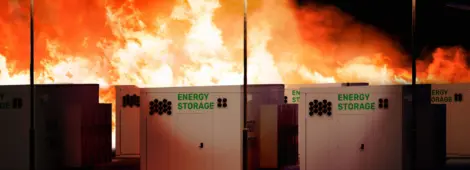
Jens Conzen, MBA
Vice President, Business Development
Chicago - Illinois

About Jens
Education / Certifications
- MBA, Data Science, Elmhurst University
- MS, Engineering Mechanics, University of Wisconsin-Madison
- Dipl. Ing., Produktiontechnik (Manufacturing/Industrial Engineering and Business), Cologne University of Applied Sciences, Germany
- Professional European Engineer, EUR ING
- Member, National Fire Protection Association (NFPA)
- Principal Technical Committee Member NFPA 855, Standard for the Installation of Stationary Energy Storage Systems, National Fire Protection Association (NFPA)
- Member, Energy Storage Fire Prevention and Mitigation Advisory Committee, EPRI
- Member, Design Institute for Emergency Relief Systems (DIERS)
- Member, American Chemical Society (ACS)
- Member, Verein Deutscher Ingenieure (VDI
About Jens
Jens is a Vice President of business development in the Midwest, and a Subject Matter Expert in Industrial and Process Safety. He has hands-on experience in various disciplines, such as engineering design, international and national engineering standards, simulation, and testing. He leads an interdisciplinary team that supports industrial customers in projects that require either a standard or customized solution approach. For customized solutions, he leverages scientific principles and confirms those with an experimental basis (i.e., data driven solutions).
He serves various industries which include power generation (renewable, nuclear, conventional), energy storage, manufacturing, pharmaceutical, and chemical production. His areas of emphasis include reactive chemical hazards (i.e., thermal runaway), overpressure safety, operational issues with power generating and power storage equipment, as well as chemical process plants. Jens supports research related to lithium-ion battery safety as well as fire and explosion safety for energy storage systems (ESS) and is extensively involved with the development of chemical reactor safety systems. Experienced with the pressure capacity and structural dynamic analysis of industrial systems, he has supported many of the leading suppliers to help them deliver more robust solutions.
Education / Certifications
- MBA, Data Science, Elmhurst University
- MS, Engineering Mechanics, University of Wisconsin-Madison
- Dipl. Ing., Produktiontechnik (Manufacturing/Industrial Engineering and Business), Cologne University of Applied Sciences, Germany
- Professional European Engineer, EUR ING
- Member, National Fire Protection Association (NFPA)
- Principal Technical Committee Member NFPA 855, Standard for the Installation of Stationary Energy Storage Systems, National Fire Protection Association (NFPA)
- Member, Energy Storage Fire Prevention and Mitigation Advisory Committee, EPRI
- Member, Design Institute for Emergency Relief Systems (DIERS)
- Member, American Chemical Society (ACS)
- Member, Verein Deutscher Ingenieure (VDI
See Insights from Jens

Powering Confidence: Large-Scale Fire Testing for Battery Energy Storage Systems
Large-Scale Fire Testing (LSFT) is now required for BESS under NFPA 855 and CSA C800. Learn how full-scale testing improves safety, supports compliance, and reduces fire risk in real-world energy storage installations.

On the Move: Hazards + Safety Lessons From Battery Energy Storage System Transport Incidents
Transporting Battery Energy Storage Systems (BESS) introduces unique fire and safety risks. Learn how proper packaging, monitoring, and planning can prevent thermal runaway and improve safety for lithium-ion BESS in transit.

UL 9540A vs. C800: How LSFT is Reshaping BESS Design + Compliance
Explore how UL 9540A and CSA/ANSI C800 differ, and why LSFT is becoming essential for BESS fire safety, risk strategy, and future NFPA 855 compliance.

What NYC’s Proposed BESS Rules Could Mean for Your Project
NYC’s new BESS rules bring stricter safety, permitting, and testing requirements. Learn how to ensure compliance from design to decommissioning.

CE Marking vs. UL 9540: Understanding Global Safety and Compliance for BESS
CE marking alone isn’t enough for BESS safety compliance in North America. Learn the key differences between CE and UL 9540 certifications—and why both may be needed for global deployment under evolving regulations.

Mitigating Lithium-Ion Battery Energy Storage Systems (BESS) Hazards
Battery energy storage systems (BESS) use an arrangement of batteries and other electrical equipment to store electrical energy.

Not-So-Silent Hazard: Water Hammer Impacts on Fluid Systems
Water hammer is a pressure surge that occurs when a fluid quickly stops or moves direction in a pipe. Learn how to manage.

Manage Chemical Reactivity Hazards with Emergency Relief System Design
Find out why your facility should have a plan in place to manage chemical reactivity hazards.